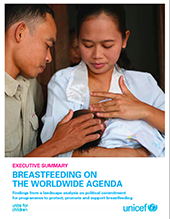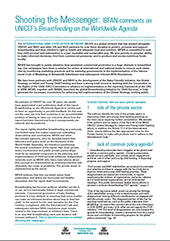UNICEF, SUN and Conflicts of Interest
IBFAN has been criticising the Scaling Up Nutrition (SUN) initiative for many things, including its lack of attention to conflicts of interest. SUN’s governing body includes major corporations and a key factor of SUN’s approach is the establishment of Public Private Partnerships in developing countries - with businesses at their core.
In response to our criticisms, SUN is now attempting to produce Conflicts of Interest (COI) guidance and on its website describes the process being managed by the Global Social Observatory (GSO). GSO is a body that is not independent of commercial interests and its efforts so far are disappointing. In particular they leave out any guidance for SUN’s own governance - ignoring the WHA 65.6 Resolution (2012), which requires COI to be addressed at all levels, not just by Member States at country level.
GSO’s ‘Reference Note’ shows poor understanding of the COI concept and the existence of irreconcilable conflicts of interest. It mixes COI with ‘Conflict resolution’ and uses concepts such as ‘mutual accountability’ that assign roles to governments that may not be democratic. No reference is available for statements such as ‘there is more to be gained by engaging all groups that are working to improve nutrition.’
● Meanwhile we are pleased that SUN has changed the reference to breastfeeding on its website. Its strategy 2012-15 still refers only to exclusive breastfeeding for 6 months, but its website refers to ‘Support for exclusive breastfeeding up to 6 months of age and continued breastfeeding together with appropriate and nutritious food up to 2 years of age, fortification of foods, micro-nutrient supplementation, treatment of severe malnutrition.’
Doctors call to end sponsorship
The International Society for Social Pediatrics and Child Health (ISSOP) has adopted a strong Position Statement explaining why baby feeding industry sponsorship damages health and the reputation of paediatricians. http://issop.org
 UNICEF's Landscape Analysis
UNICEF's Landscape Analysis

UNICEF published a new paper in September entitled Breastfeeding on the Worldwide Agenda - a landscape analysis on political commitment for programmes to protect, promote and support breastfeeding. The report is based on interviews, including with IBFAN. While the report rightly identifies breastfeeding as a seriously overlooked issue, we are concerned about many of its observations and conclusions. Its focus on the promotion of breastfeeding (rather than its protection) and its failure to stress the obligations of governments to protect child rights. While identifying relations with the private sector as an area needing further consultation, the report suggests that private sector involvement and public private partnerships are an essential component in the planning and implementation of child survival initiatives. We see this approach, also used by SUN, as being highly problematic, and overlooking the Global Strategy on Infant and Young Child Feeding that clearly identifies two appropriate roles for the Private Sector: make safe products and adhere to the International Code.
UNICEF shares our understanding that marketing practices that violate the International Code are a key obstacle to ensuring that every mother can make an informed decision about how to feed her child and we will be discussing with them modes of collaboration that would advance implementation of the Global Strategy and other relevant WHA policies.






